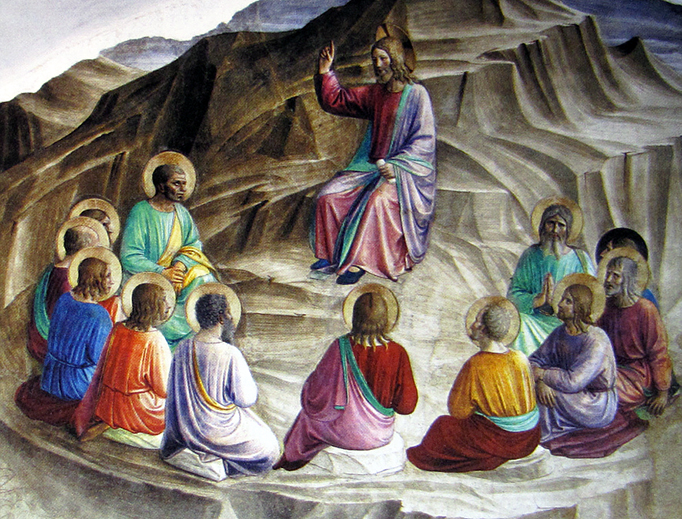Christmas as the Intimation of the Beatitudes
 As I prepared a presentation some years ago on the Beatitudes, Christmas had been in the background of my thought. The Beatitudes mark the frontier between history and eschatology. They accent the biblical vision of peripateia or “reversal.” We see a newborn child laid in the feeding stall of beasts and then described as the reason for “good tidings of great joy.” The Beatitudes are Jesus’ description and promise of that reversal between what seems to be and what really is and will be, thus between what seems to be good in our blunted vision of reality and what is good now already and will be eternally. As Saint John Paul II once expressed it: “Indeed, each of the Beatitudes promises, from a particular viewpoint, that very ‘good’ which opens man up to eternal life, and indeed is eternal life.” (Veritatis Splendor #16). If we reflect on the mystery of Christmas as expressing the Christian life in all its paradoxical practicality, we will be led to understand the message of the Beatitudes.
As I prepared a presentation some years ago on the Beatitudes, Christmas had been in the background of my thought. The Beatitudes mark the frontier between history and eschatology. They accent the biblical vision of peripateia or “reversal.” We see a newborn child laid in the feeding stall of beasts and then described as the reason for “good tidings of great joy.” The Beatitudes are Jesus’ description and promise of that reversal between what seems to be and what really is and will be, thus between what seems to be good in our blunted vision of reality and what is good now already and will be eternally. As Saint John Paul II once expressed it: “Indeed, each of the Beatitudes promises, from a particular viewpoint, that very ‘good’ which opens man up to eternal life, and indeed is eternal life.” (Veritatis Splendor #16). If we reflect on the mystery of Christmas as expressing the Christian life in all its paradoxical practicality, we will be led to understand the message of the Beatitudes.
Henri de Lubac once wrote: “Paradox is the reverse of what, properly perceived, would be synthesis… Paradox is the search or wait for synthesis.” The Greek word paradoxos can evoke the notion of something strange, wonderful, or remarkable (ex. gr. Lk 5:26). One dictionary gives the following definitions: “A statement contrary to common belief. A statement that seems contradictory, unbelievable, or absurd but that may actually be true in fact. Something inconsistent with common experience or having contradictory qualities.”[1] To call Christmas paradoxical is to say that it is strange and wonderful, almost unbelievable or absurd, even contradictory, but actually true. It is an invitation to rise to a plane of life and understanding where we can experience the synthesis between limit and non-limit. The angel expressed it beautifully:
"Do not be afraid; for behold, I proclaim to you good news of great joy that will be for all the people. 11For today in the city of David a savior has been born for you who is Messiah and Lord. 12And this will be a sign for you: you will find an infant wrapped in swaddling clothes and lying in a manger." (Luke 2:10-12)
The paradox of Christmas was brought home to me one Christmas Eve. I was preparing to celebrate Midnight Mass in Bethlehem for some of the local Catholics. The city was, of course, crowded with as many as could fit in the Basilica; Midnight Mass in Bethlehem is an international event. At a few minutes before midnight, there was an explosion. Immediately, armed soldiers appeared and began to scour the city. The tension was electric. Soon, it was discovered that a young man, attempting secretely to put together a bomb, has detonated it and was killed. He himself had become a paradox: his search for peace and freedom became a violent attempt to inflict harm and had led him to a mistaken “search for synthesis.” Let us pray this Christmas that all people understand that the world is changed by love; that the paradox of love, not violence, is the way to peace, and that this is costly:
“Blessed are the courageous peacemakers, they will resemble their Father.” (Matthew 5:9)
Fr. Francis Martin (2013)
Edited by Bernadette Harmon (2018)
[1]Webster’s New Universal Unabridged Dictionary (New York: Simon and Schuster, 1983).